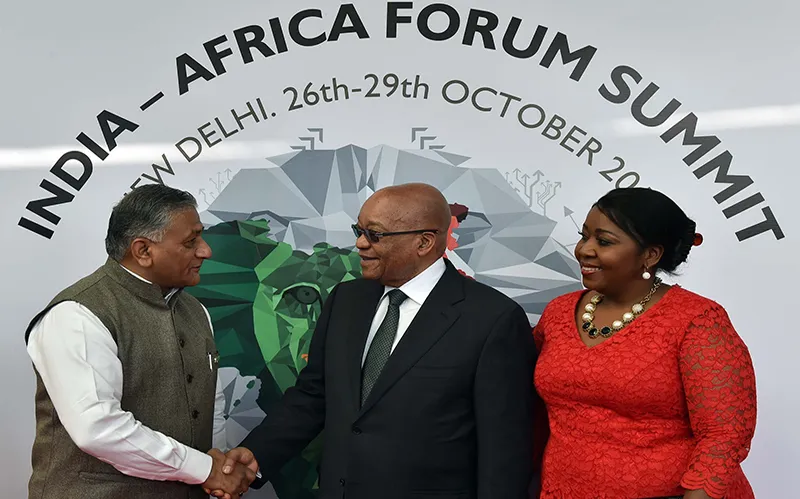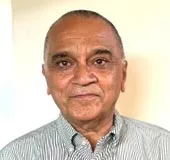-
CENTRES
Progammes & Centres
Location
How can we differentiate ourselves from China whilst dealing with Africa? Clearly the worst option would be to emulate the muscular Chinese style of economic diplomacy. For one we just don't have the firepower. For another the principle of comparative advantage advocates that everyone must play to their strengths.

African heads of State will don Modi kurtas and party in New Delhi, October 27 to 29. The occasion is the third meeting of the Indo African Summit. It would be quite a sight to see Robert Mugabe, age 91, President of Zimbabwe for the last two decades, take a turn or two on the dance floor. But we may have to make do with the more agile President Jacob Zuma.
Hopefully, the parallel with ASEAN will not extend to Minister Sushma Swaraj having to sing at the concluding party, just to liven up the proceedings, along the lines of Madeline Albright, US Secretary of State in 1997, who crooned her version of "Don't cry for me Argentina".
Beyond the theatrics, it is tough to figure out what we want to achieve with the possibly 40 heads of state or governments and many more senior politicians and officials from Africa who are expected to participate. Similar summits were held in 2008 and again in 2011.
Claim the 21st century for Africa and India
Demographics suggests that the second half of this century belongs to Africa and India. But to claim this "historical destiny" India and Africa have to do the right things. One such is to put the right institutions in place.
This "mirror" long term need is what binds India to African countries far more than the standard diplomatic fare; trade and investment, terrorism and security. These are merely the transactional outcomes of sound institutional development and better dealt with at specialized fora which already exist like the World Trade Organization, the United Nations and the Bretton Woods institutions and their offshoots.
Context is key for developing "best fit" institutions. Context varies enormously between India and Africa and even more so within Africa. But one common theme across most African countries is a rich endowment of natural resources (except Rwanda and Burundi) which distinguishes them from resource poor India.
In contrast, adherence to broad democratic norms is increasingly the preferred option across Africa. Swaziland and Lesotho remain the only kingdoms in sub-Saharan Africa. Yesterdays "dictators" are today's leaders, who test their popularity in elections.
India has been the world's largest democracy since 1947. In Africa Senegal has similarly been a multi-party democracy since 1960 when it became independent. Senegal had its "Indira Gandhi moment" in the first decade of this century when then President Wade tried to unduly empower the executive through constitutional amendments. The democratic backlash was strong and he lost in elections to his own Prime Minister in 2012- President Small still leads today. Mauritius, Kenya, Tanzania, Zambia, and later South Africa, Botswana and Namibia also have stellar democratic records.
African public service structures have evolved unlike ours which have atrophied
The institutional architecture within which government functions is critical for achieving developmental goals. Within the broad institutional architecture the manner in which the civil service is structured is key. India has much to learn from select countries. South Africa, Ghana, Senegal, Mauritius, Kenya, Tanzania and Ethiopia for instance, have developed and maintained outstanding public service structures and traditions.
These bureaucracies have weathered far more tumultuous times than we in India have ever encountered in the post- World War II period. But they remained committed, motivated and deliver results- three characteristics that are iffy to apply across the board in India.
India presents a fascinating case study of asymmetric development. On the one hand we have scientists sending space expeditions to Mars. At the other end poor villagers still rely on traditional healers and "bangali" doctors- sometimes out of choice and habit but mostly out of compulsion since the public health service is so poor.
It is fashionable today to advocate the case for asymmetric development- getting reform in through the door wherever possible without attempting an across the board improvement in the civil service. India is a good example of how this does not work. Islands of excellence remain just that cordoned and insulated from the ills that afflict service areas not considered critical from the short term (sighted) point of view.
India manufactures or assembles more brands of cars, scooters and motorcycles in India than it is possible to remember. We pride ourselves on our in-house capacity for developing infrastructure. We have embarked on a "make in India" mission. Foreign students come to India to study management, medicine and engineering.
Yet, within the government, it is rare to find an official with the relevant technical qualifications, in a senior position with decision making powers. This is not to say that our top bureaucrats are not highly educated. Invariably they do have these credentials, in a general way. Many may even be a PhD. It doesn't get better. But rarely is it that the academic qualifications and the experience overlap. This disregard for "technical excellence" as a driver of good public administration is at the root of our inability to apply the vast knowledge reserves we have built up to improving public services on the ground.
We should learn for countries in Africa which have done away with the hierarchical, cadre based, colonial administration systems they inherited and have moved on to a position based meritocracy. South Africa, Mauritius, Ghana, Senegal, Kenya and Tanzania are examples.
Our federal structure is an outstanding example of contextual decentralization
Whilst our Constitution is a Union of States rather than being a federation like the US Constitution, it is a dynamic yet robust instrument. It has been amended one hundred times since 1952 but it remains the driving force for growing the "Idea of India" as a single nation comprising unparalleled diversity in religion, ethnicity and culture.
Much of richness of the Indian public management experience derives from the significant levels of devolution to the thirty state governments. Around 40% of the Union government's revenues are made available to state governments as their share of tax. An additional 15% of funds are transferred to state governments for executing national development schemes. State governments also have their own sources of revenue.
The size and character of states varies enormously in India. These range from the mammoth Uttar Pradesh (UP) with a population of 200 million (the next biggest state is Bihar with pop. 100 million) to tiny Sikkim population 600,000.
Uttar Pradesh is larger than the largest African nation-Nigeria-pop. 189 million, renowned for its oil rich economy, entrepreneurial people and pluralistic society.
Sikkim, sticking out like a "thumbs up" between Nepal and China in North Eastern India with streets neat as a pin and people, as disciplined as the Rwandans closely resembles the well governed, gorgeous, North Western African island nation of Cape Verde.
Africa manages regional co-operation exceedingly well
India should look closely at the cross country arrangements within Africa which facilitate development based on the comparative advantage of countries. Power pooling across the Southern Cone countries and West Africa is one such example. Access to sea routes for land locked countries like Zambia, Zimbabwe and Uganda via rail, road and pipelines provides good models for cost sharing across Indian states. Truth and reconciliation type negotiations are another African specialty.
The Indian institutional arrangements for regional integration have fallen into disuse and are ineffective. Water sharing arrangements are particularly dissatisfactory and legal disputes linger for years, increasing conflict and retarding development. Similarly implementing the Goods and Services tax- a single, value added tax, to replace state level taxes on the production and sale of products, to which all parties are agreed in principle, has become harder and more painful than extracting a tooth.
It may have been really useful to arrange sessions where state chief ministers could have interacted with heads of state depending on areas of mutual interest with their officials following up on the detailed areas of cooperation.
We are not China
Finally how can we differentiate ourselves from China whilst dealing with Africa? Clearly the worst option would be to emulate the muscular Chinese style of economic diplomacy. For one we just don't have the firepower. For another the principle of comparative advantage advocates that everyone must play to their strengths.
China's comparative advantage is cash-lots of it. But the Chinese model of development is not something which is easily replicated because of the size of its economy, the homogeneity of its population and its long history of splendid isolation. Also it is unlikely that exporting workers in droves to implement projects overseas is a sustainable or effective developmental strategy for the beneficiary countries.
Our comparative strength is that we are the "Constantinople of Parliamentary Democracy". We straddle the democratic heritage of the West and the traditional Asian democratic principles. In doing so we have evolved a home spun democratic model. Like all jugaad (learning by doing) the ends of this model are a bit jagged.
Nevertheless, it is a model which works- both for economic growth and to uphold the human liberties of speech, association and property. Within this generic model of development lie gems of granular achievement at the state government and local level, which provide solutions to the universal development barriers of elite control, low initial capacity, nascent institutions and less than adequate rule of law mechanisms.
India must use the Summit to share these nuggets of experience which are at the heart of building institutional resilience for sustainable development in poor countries.
(The writer is an Advisor to Observer Research Foundation, Delhi)
The views expressed above belong to the author(s). ORF research and analyses now available on Telegram! Click here to access our curated content — blogs, longforms and interviews.

Sanjeev S. Ahluwalia has core skills in institutional analysis, energy and economic regulation and public financial management backed by eight years of project management experience ...
Read More +